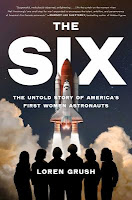by Olivia Campbell
Park Row Books, 2024. 384 pages. Nonfiction
In the 1930s, Germany was a hotbed of scientific thought. But after the Nazis took power, Jewish and female citizens were forced out of their academic positions. Hedwig Kohn, Lise Meitner, Hertha Sponer, and Hildegard Stücklen were eminent in their fields, but they had no choice but to flee due to their Jewish ancestry or anti-Nazi sentiments. Their harrowing journey out of Germany became a life-and-death situation that required herculean efforts of friends and other prominent scientists. No matter their destination, each woman revolutionized the field of physics when all odds were stacked against them, galvanizing young women to do the same.
This book was a fascinating combination of some of my favorite types of nonfiction: it's a history book, an approachable science book, and the stories of real-life people all rolled into one. The combination of subjects gave me a new perspective on European history of the 1930s and 1940s, and helped me see how the rise of Nazism affected both the lives of real-life people, and the fate of scientific study. Those who enjoy well-told histories and biographies will find a lot to appreciate in this book.
If you like Sisters in Science you might also like:
The Elements of Marie Curie: How the Glow of Radium Lit a Path for Women in Scienceby Dava Sobel
Atlantic Monthly Press, 2024. 318 pages. Nonfiction
A luminous chronicle of the most famous woman in the history of science, and the untold story of the many remarkable young women trained in her laboratory who were launched into stellar scientific careers of their own.
The Six: The Untold Story of America's First Women Astronautsby Loren Grush
Scribner, 2023. 422 pages. Nonfiction
When NASA sent astronauts to the moon in the 1960s and 1970s the agency excluded women from the corps, arguing that only military test pilots--a group then made up exclusively of men--had the right stuff. Eventually, though, NASA recognized its blunder and opened the application process to a wider array of hopefuls, regardless of race or gender. From a candidate pool of 8,000 six elite women were selected in 1978--Sally Ride, Judy Resnik, Anna Fisher, Kathy Sullivan, Shannon Lucid, and Rhea Seddon.
MB



No comments:
Post a Comment